It’s no secret that pulling a heavy trailer can be a real pain.
That’s why many people rely on an equalizer hitch to help distribute the weight evenly.
But what if you’re not sure how to adjust it?
Don’t worry – we’ve got you covered.
In this post, we’ll show you how to adjust your equalizer hitch for optimal performance.
Stay safe and enjoy the ride!
How To Adjust An Equalizer Hitch?
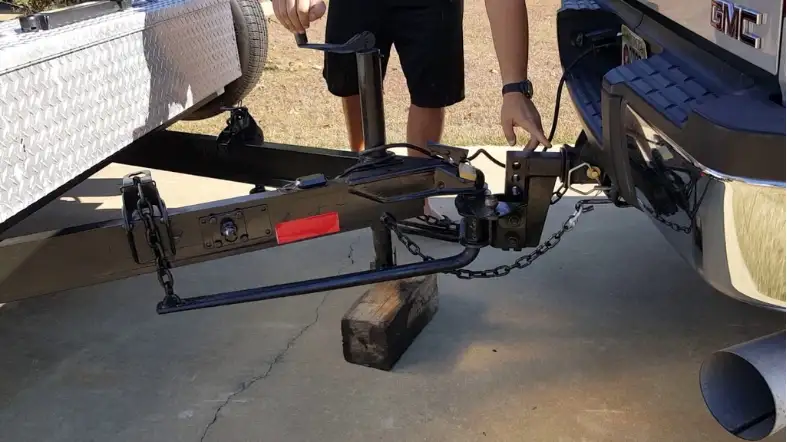
Step 1: Make Sure Your Vehicle is Level
The first step in adjusting an equalizer hitch is making sure that your tow vehicle is parked on level ground.
If not, then you won’t be able to accurately adjust the hitch and get the best results.
Step 2: Adjust the Hitch Bar Height
Once your tow vehicle has been leveled, you can start adjusting the height of the hitch bar.
You want to make sure that it’s at the same height as your trailer coupling, and this should be done before connecting them together.
This will ensure that they are level when connected which will help with balance and stability.
Step 3: Connect The Tow Vehicle and Trailer Together
Now it’s time to connect your tow vehicle and trailer together using the equalizer hitch.
Start by attaching one end of the hitch bar to your vehicle’s receiver and then attach the other end to your trailer coupling.
Make sure everything is securely connected before moving on to step four.
Step 4: Adjust The Spring Bars
Now comes the tricky part—adjusting the spring bars.
This is where all of your previous steps come into play—you want to make sure that everything is level before doing this step so that you can get an accurate reading while adjusting them.
To adjust them, use a torque wrench or socket wrench (depending on what type of pins are used) and turn each pin until all four pins have an equal amount of tension applied.
Once finished, double check everything again just in case something needs readjusted or tightened down more securely.
Step 5: Test Out Your New Hitch Setup
Once everything is connected and adjusted properly, test out the new setup by towing your trailer along a road or trail.
If you notice that the hitch seems unsteady or doesn’t seem to be working properly, then you may need to go back and make some more adjustments until it feels secure and stable.
how does an equalizer hitch work?
An equalizer hitch is a device that helps to evenly distribute the weight of your trailer between your tow vehicle and the trailer itself.
It does this by providing a connection point between the two that allows for movement and distribution of weight.
Equalizer hitches are typically made from high-quality materials and have a lifetime warranty, making them a popular choice among trailer owners.
It works following these steps,
- First, the equalizer hitch is attached to the tow vehicle.
- Then, the trailer is connected to the hitch.
- The hitch then provides a connection point between the tow vehicle and the trailer, allowing for weight movement and distribution.
- Finally, the weight of the trailer is evenly distributed between the tow vehicle and the trailer, providing a more balanced and stable tow.
The Benefits Of Using An Equalizer Hitch?
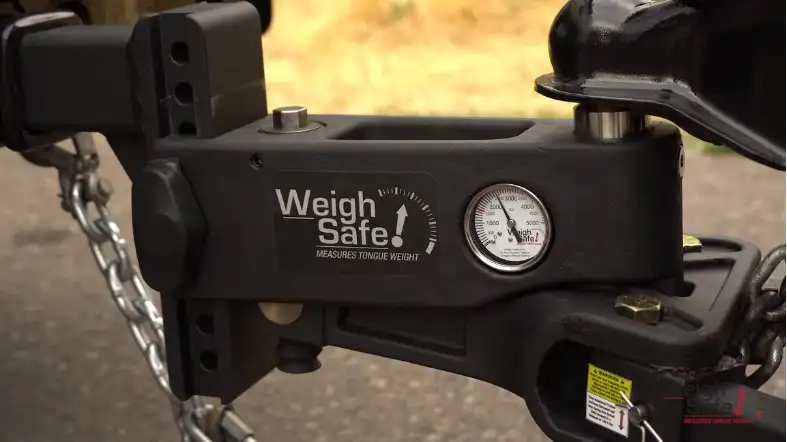
The benefits are many, but here are some key points:
- Equalizer hitches help to distribute the weight of your trailer evenly between your tow vehicle and the trailer itself.
- This assists in providing better stability and control while towing, and can help to prevent accidents.
- Equalizer hitches are also very durable and long-lasting, so you can use them for many years to come.
- Plus, with a lifetime warranty, you can be confident that your investment is protected.
How To Choose Equalizer Hitch?
There are a few things to consider when choosing an equalizer hitch while adjusting.
The first is the size of the trailer.
The next is the weight capacity. And finally, the type of terrain you’ll be traveling on.
Size
The size of the trailer will dictate the size of the hitch.
If you have a small trailer, you’ll need a smaller hitch.
Conversely, if you have a large trailer, you’ll need a larger hitch.
Weight Capacity
The weight capacity of the hitch will dictate how much weight the hitch can support.
If you have a small trailer, you won’t need as much weight capacity.
Conversely, if you have a large trailer, you’ll need more weight capacity.
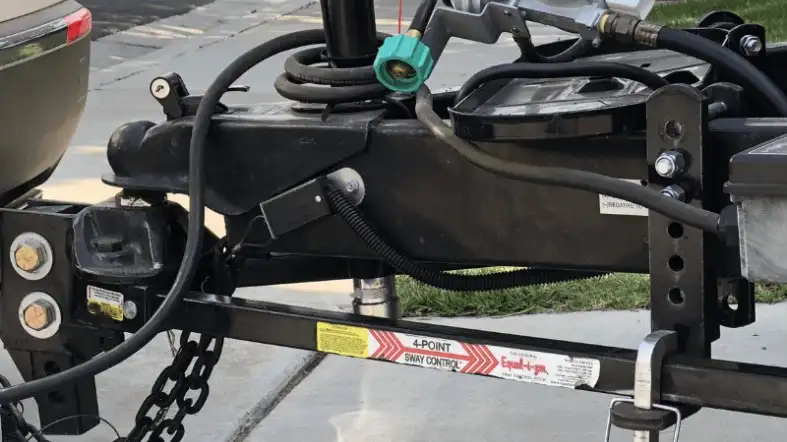
Type of Terrain
The type of terrain you’ll be traveling on will dictate the type of hitch you’ll need.
If you’ll be traveling on flat, smooth terrain, you won’t need as much weight capacity.
Conversely, if you’ll be traveling on rough, uneven terrain, you’ll need more weight capacity.
There are two types of equalizer hitches: the chain type and the bar type.
Chain Type
The first type is the chain type.
This hitch has a chain with two hooks on each end.
The hooks are attached to the trailer and the tow vehicle.
To adjust this hitch, simply move the chains to the desired position.
Bar Type
The second type is the bar type. This hitch has a bar with two holes on each end.
The holes are attached to the trailer and the tow vehicle.
To adjust this hitch, simply insert the bars into the desired position.
How To Properly Adjust An Equalizer Hitch?
The first step is to determine the correct setting for your particular trailer and tow vehicle combination.
Once you have done this, follow these instructions:
Place The Equalizer Hitch On The Trailer Tongue.
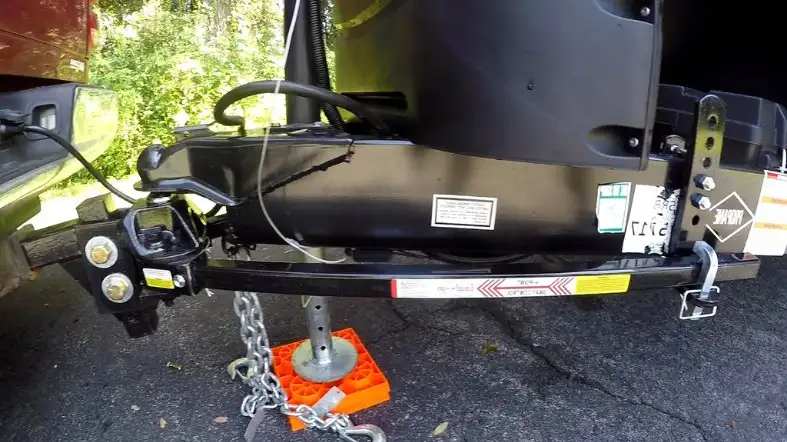
On the trailer tongue, there should be a bracket that the equalizer hitch can be attached.
If there is no bracket, you can use an adjustable clamp to attach the hitch to the tongue.
Secure the hitch using the provided pins and clips.
Provide pins and clips to ensure the hitch is securely attached.
This will help to prevent it from coming loose while you are towing.
Adjust the chains or straps until they are tight, but not too tight.
Now, you will need to adjust the chains.
The chains should be equal in length on both sides of the hitch.
To adjust the chains, use the provided wrench to loosen the nuts on the adjustment bolts.
Next, use the wrench to turn the bolts until the chains are the correct length.
Finally, tighten the nuts back down to secure the chains in place.
Test the hitch by pulling on it slightly to make sure it is secure.
Make sure that it is secure by tugging it slightly.
You don’t want it to come loose while you are towing.
Now, you are ready to hit the road!
Tips For Getting The Perfect Adjustment For Your Needs?
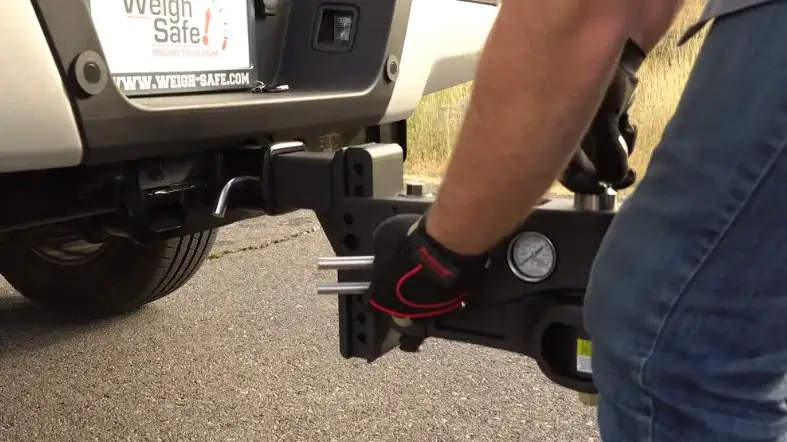
There are a few things to remember when adjusting your equalizer to ensure that it meets your needs.
Ensure the hitch is properly attached to the tow vehicle.
It is important to make sure that the hitch is properly attached to the tow vehicle in order to ensure a secure connection.
Make sure the trailer is properly connected to the hitch.
Ensure that the trailer is properly connected to the hitch in order to prevent it from becoming disconnected during use.
Adjust the hitch to distribute the weight evenly.
Once the hitch is properly attached and the trailer is connected, adjust the hitch to distribute the weight evenly between the tow vehicle and the trailer.
This will help to provide a more balanced and stable tow.
Check the hitch regularly to ensure it is still properly adjusted.
It is important to check the hitch regularly to ensure that it is still properly adjusted and that the weight is still evenly distributed.
This will help to prevent any problems from occurring during use.
Test drive your vehicle and trailer to ensure proper balance and stability.
After adjusting the hitch, it is important to test drive your vehicle and trailer to ensure that the weight is evenly distributed and that the tow is stable.
This will help to prevent any problems from occurring during use.
FAQs about Adjusting an Equalizer Hitch
How Often Should I Adjust My Equalizer Hitch?
It is essential to check the hitch regularly to ensure that it is still properly adjusted and that the weight is still evenly distributed.
This will help to prevent any problems from occurring during use.
How Do I Know If My Hitch Is Properly Adjusted?
A good way to test the hitch is by pulling on it slightly to make sure it is secure.
You don’t want it to come loose while you are towing.
Another good way to test the hitch is by driving your vehicle and trailer combination to see how it handles on the road.
If you feel like the tow is unstable, then it is likely that the hitch is not properly adjusted.
Can I Adjust My Hitch Myself?
Yes, you can adjust your hitch yourself as long as you have the correct tools and instructions.
If you are not confident in your ability to properly adjust the hitch, then it is always best to consult with a professional.
How Much Does It Cost To Have A Professional Adjust My Hitch?
The cost of having a professional adjust your hitch will vary depending on the service provider.
However, it is generally a fairly inexpensive service.
The bottom lines
Adjusting an equalizer hitch may seem like a daunting task, but with these simple steps, it doesn’t have to be!
By following this guide you’ll be able to easily adjust your equalizer hitch so that you can have peace of mind knowing that your tow vehicle and trailer are balanced properly for safe driving conditions.
So next time you’re ready for a journey take some time beforehand to make sure your equalizer hitch is adjusted properly; it could save you from unnecessary stress down the road!
